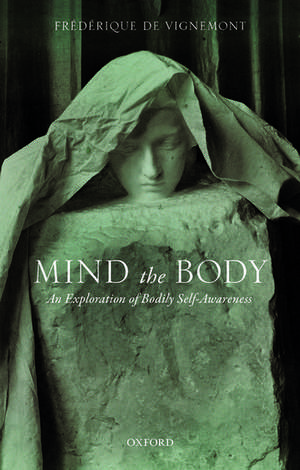Mind the Body: An Exploration of Bodily Self-Awareness
Autor Frédérique de Vignemonten Limba Engleză Hardback – feb 2018
| Toate formatele și edițiile | Preț | Express |
|---|---|---|
| Paperback (1) | 185.47 lei 10-16 zile | |
| OUP OXFORD – 27 feb 2020 | 185.47 lei 10-16 zile | |
| Hardback (1) | 340.29 lei 31-37 zile | |
| OUP OXFORD – feb 2018 | 340.29 lei 31-37 zile |
Preț: 340.29 lei
Preț vechi: 434.19 lei
-22% Nou
Puncte Express: 510
Preț estimativ în valută:
65.12€ • 67.74$ • 53.76£
65.12€ • 67.74$ • 53.76£
Carte tipărită la comandă
Livrare economică 03-09 aprilie
Preluare comenzi: 021 569.72.76
Specificații
ISBN-13: 9780198735885
ISBN-10: 019873588X
Pagini: 278
Dimensiuni: 148 x 220 x 22 mm
Greutate: 0.48 kg
Editura: OUP OXFORD
Colecția OUP Oxford
Locul publicării:Oxford, United Kingdom
ISBN-10: 019873588X
Pagini: 278
Dimensiuni: 148 x 220 x 22 mm
Greutate: 0.48 kg
Editura: OUP OXFORD
Colecția OUP Oxford
Locul publicării:Oxford, United Kingdom
Recenzii
A valuable contribution to the interdisciplinary field of cognitive science, de Vignemont's book is best suited for specialists in this field.
[an] extremely well-researched and thought-provoking book, which certainly adds substantially to the interdisciplinary study of bodily awareness and bodily experience.
Frédérique de Vignemont has written a superb book on the body and the sense of body ownership: what its function is and how it is grounded in spatial experience and affective phenomenology. It combines incisive philosophical argumentation with total command of the psychology and neuroscience of bodily experience. It is the best philosophical book ever on the body and a model of how to do empirically informed philosophy of mind.
The body is "always there" in William James's famous phrase ... but this pervasiveness makes it harder, rather than easier, to understand the relation between body and self. This book extends the current focus on the importance of the body in philosophy of mind, using the recent surge in experimental studies of bodily awareness. In doing so, it provides the first cognitively-informed account of how, and perhaps even why, we are aware of our body as our own. It is a rare and compelling example of how combining conceptual analysis and experimental data can advance cognitive theory.
[an] extremely well-researched and thought-provoking book, which certainly adds substantially to the interdisciplinary study of bodily awareness and bodily experience.
Frédérique de Vignemont has written a superb book on the body and the sense of body ownership: what its function is and how it is grounded in spatial experience and affective phenomenology. It combines incisive philosophical argumentation with total command of the psychology and neuroscience of bodily experience. It is the best philosophical book ever on the body and a model of how to do empirically informed philosophy of mind.
The body is "always there" in William James's famous phrase ... but this pervasiveness makes it harder, rather than easier, to understand the relation between body and self. This book extends the current focus on the importance of the body in philosophy of mind, using the recent surge in experimental studies of bodily awareness. In doing so, it provides the first cognitively-informed account of how, and perhaps even why, we are aware of our body as our own. It is a rare and compelling example of how combining conceptual analysis and experimental data can advance cognitive theory.
Notă biografică
Frédérique de Vignemont is a CNRS research director at the Jean Nicod Institute in Paris. Her research is at the intersection of philosophy of mind and cognitive science. Her major current works focus on bodily awareness, self-consciousness, and social cognition. Her new project investigates the perceptual peculiarities of peripersonal space, which can be conceived of as the territory of the self. She has published widely in philosophy and psychology journals on the first-person, body schema, agency, empathy, and more recently on pain. She is the recipient of the 2015 Young Mind & Brain prize. She is also one of the executive editors of the Review of Philosophy and Psychology.
